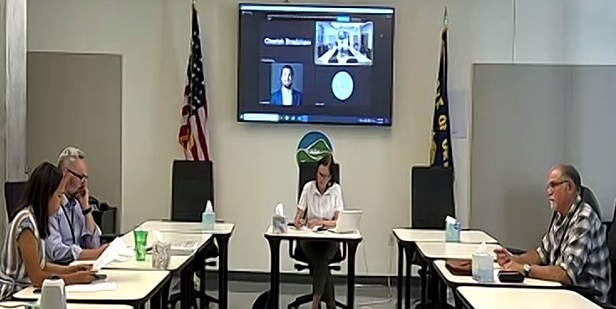Eugene mayor: Governor ‘a little blind and deaf’ to city homelessness challenges
7 min read
Eugene Mayor Lucy Vinis says the governor is being “a little blind and deaf” to the challenges cities face on homelessness. The recent legislative session ended with no money for Eugene’s top priorities: unhoused response, Clear Lake, and Crow Road. On July 5:
[00:00:18] Ethan Nelson (City of Eugene intergovernmental relations manager): There’s a couple wins and a couple losses. Big losses.
[00:00:22] So number one: We did not receive any direct funding from the legislature for unhoused response. Neither did any city in the state.
[00:00:31] And so there’s a lot of review and discussion on this. We were having a debrief, (League of Oregon Cities) LOC staff and a number of other city lobbyists, and I asked the question, I said that in my period of time doing this, eight different legislative sessions, this was the most coordinated I’ve ever seen LOC and cities be and provide materials, talking points, coordination.
[00:00:57] And we were just stopped from the get-go. Even when you met with the governor prior to the session starting, it was pretty clear. She said, ‘I’m not going to support this,’ and the legislature followed suit. And so we didn’t really have a sense of what else could we have done.
[00:01:16] Councilor Randy Groves: Ethan, did we get any indication of why there was no support for it anywhere in the state?
[00:01:23] Ethan Nelson (City of Eugene): Councilor Groves, that’s a great question, and there’s two aspects of the response, I’ll give them to you. One is that I’ve been asking directly to our legislative members for our region that question, and I have, heretofore, gotten no response.
[00:01:38] And then second was when we met with the governor, the governor basically was saying, ‘I’m not going to give money to cities. I’ll give money to this new framework that we’re setting on up, that or the existing framework,’ you know, money going from the state to continuums of care, which in our case is Lane County, to then distribute through existing frameworks.
[00:01:57] And my conversations then with governor’s staff over the course of time was, ‘Well, then there’s going to be…increased accountability for those dollars and those outcomes in communities like Eugene?’ And there was not necessarily a clear, resolute ‘Yes.’
[00:02:14] Mayor Lucy Vinis: My read on this is that the governor has a commitment or a belief that this work should be conducted at the county level, and so she’s putting all of her direction to the county level, and she gets it that cities are picking up where the county left off, and what she’s trying to do is prime the pump at the county level so they’ll actually pick up more of the work…
[00:02:32] It’s being a little blind and deaf to actually the challenge that we have, which is that there’s a huge gap between what the county is able to accomplish and what we need to accomplish as a city.
[00:02:41] But…she asked about how the system should work and how she wants it to work. She wants it to work more effectively for the counties. So she’s giving them the money.
[00:02:51] Councilor Randy Groves: I’m going to choose my words carefully here. But sitting on (Lane County’s Human Services Commission) HSC and seeing where all the proposed cuts were, which were primarily around Eugene programs that help with this issue, I’m very concerned about this. I know I’m preaching to the choir here, but I already feel like we’re being short-sheeted on this whole process, but we have the lion’s share of the challenge.
[00:03:13] And in my going around on the street, engaging certain groups of unhoused, a lot of them are from rural Lane County who locate here for the services. So they’re in our community. There’s no question about that. We need to do something, but it just isn’t fair to place all the burden on the Eugene taxpayers and not being able to get what I think is an adequate share of the county resources to help with (what is) a regional problem, a state problem, a national problem.
[00:03:46] Mayor Lucy Vinis: I guess the question I have is why the cities are so poorly positioned to get our requests met… It’s pretty concerning in this long session that we had a really well-thought-out set of strategies, and we didn’t get robust support from anyone, even in those in-person meetings.
[00:04:02] So I don’t know. Maybe that’s a role for me with some of those legislators, to have a candid conversation: ‘What’s the issue here, especially on the homelessness piece…’
[00:04:11] The League of Oregon Cities is meeting in Eugene in the fall. And so it feels like there’s maybe a conversation to convene or work with LOC on debriefing that and how do we put the cities in a better position still to get what we need, particularly on the homelessness issue.
[00:04:29] John Q: After unhoused response, the city’s next funding priorities:
[00:04:35] Ethan Nelson (City of Eugene): So then moving on for our Clear Lake road infrastructure request and our Crow Road infrastructure request. Neither of those were funded either. And so, again, I’ve been seeking some response to find out why we were not allocated those funds.
[00:04:52] This year, … our area suffered. And so, that’s one of the reasons why I’m really curious. I’ve been reaching out to our legislators to set up meetings to have discussions, the heart-to-heart of, ‘Can you help us understand why we were not successful?’
[00:05:06] Because we did this by the book and put in a lot of investment of time. We had (Eugene) Chamber (of Commerce), the realtors, (Home Builders Association) HBA, the mayor, all together in our legislators’ offices saying, ‘This matters.’ You gave testimony, you gave testimony and nothing. And not even a response. So, we’re working through that.
[00:05:31] John Q: But wait, there’s more: CAHOOTS is not eligible for funding under the new federal law that was based on CAHOOTS.
[00:05:39] Ethan Nelson (City of Eugene): In numerous conversations with our internal staff, it became clear that our CAHOOTS system does not configure and align with the way that the federal government and (Oregon Health Authority), are now promulgating rules related to the operations of a mobile crisis response system.
[00:06:00] So we’re working through that. And I think (Eugene Springfield Fire) Chief (Mike) Caven is really scratching his head now that CAHOOTS is over in his shop to figure on out how (and especially since they operate Medicaid billing already), is to figure on out if there’s a way to make this connected.
[00:06:17] We asked for things and we were told directly, ‘No,’ and that was pretty bluntly described to us. And we said, ‘That doesn’t make sense. If we’re carrying all the water on this, then we should be able to get some of the state funds and that was our whole purpose for being in this discussion.’ And that was clearly and forcefully said, ‘No, that’s not how we’re going to operate this.’
[00:06:41] And at one point, I even asked, ‘I just want to get this clear: You are requiring local governments to meet a new standard. You’re not going to allow us to raise revenue and there’s going to be the expectation that we’re going to have to bring in revenue to fully fund the services because you know that the state’s not going to fully fund services.’
[00:07:04] ‘Yes, that’s correct.’
[00:07:06] John Q: Ethan explained that local experts were not consulted on the bill.
[00:07:09] Ethan Nelson (City of Eugene): The CAHOOTS Act was created not by practitioners, and so it was created in almost a policy lab environment to say, ‘This is what we think it should look like.’ And then there’s all these practical realities where our folks are saying, ‘Oh, this doesn’t work.’
[00:07:25] And so, for instance, one of the requirements at the federal level is that every street unit have a licensed professional mental health crisis provider…24-hour service would need four of those people and those people cost at least $130,000 a year plus benefits.
[00:07:49] And we’re saying, ‘Okay, well, can there be exemptions?’ And so then it comes down to the state level and OHA adopted a new program to really access some of this Medicaid reimbursement dollars. And as they were adopting these rules, they were basically saying, ‘Well, here’s what the new crisis response systems need to look like. And this is what CAHOOTS is. If CAHOOTS wants to fit into this model, we need to get personal data on every single person that is served’, because then they need to then push them on into a reimbursement system—which CAHOOTS doesn’t do right now.
[00:08:20] So that’s one of a number of different ways that our system works that is not the way that the state and the federal government have set up their system.
[00:08:30] John Q: The governor wants counties to take a lead role on homelessness. Eugene asked about accountability, but didn’t get an answer, and legislators are not returning their calls.





